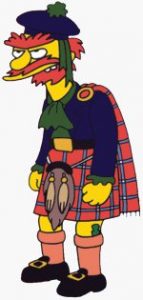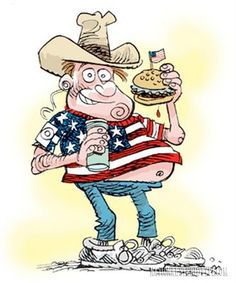Hi folks, Martin here again. I’m going to talk about something I’ve touched on a couple of times, but I thought it was worth devoting a post to it here and now. I’m going to visit a Unit Training weekend tomorrow. I won’t say where but it involves a bit of a drive for me. I’m hoping that next week’s post will focus on that little adventure, but this week is a post I started working on last year and I’ve managed to get finished over this weeks lunch breaks.
If you’ve been fortunate enough to attend an international event before you’ll understand what I’m talking about here, but if this is the first time you’ve been abroad with Scouting it might be something you’ve never thought about before.
I’d like to start by asking you to think about stereotypes. We see them every day in television and film, in books and magazines and adverts. I’m as guilty of it as anyone else. How we see other people, and especially other cultures, is influenced by our upbringing and the media we ingest. Using my own culture as an example, if you asked various people how they saw a stereotypical Scottish person, you’d probably get a range of answers that, when sketched, would look a little like this…

You’d get answers that would equate us all to nearly-incomprehensible, angry, sweary, ginger-haired, tight-fisted, drunkards who constantly wear a kilt, play the bagpipes and hate the English, all the while purely subsisting on Irn Bru and Haggis.
I can quite unequivocally say that that’s not quite correct.
I mean. I’m not ginger…
I have friends who I could describe with many of these things, though I wouldn’t describe any one person I know as all those things, and some of those descriptors could be applied to me. Similarly I have Scottish friends who are nothing like anything I’ve described. Even taking the “average” Scot, it’s not really that accurate. We are all individuals, no matter where we come from, sometimes with common traits or backgrounds. Clumping us all together and assigning us a characteristic because we’re from the same village/town/city/county/country/continent/hemisphere/planet etc. is the basis of Stereotyping.
Google defines the word Stereotype as “a widely held but fixed and oversimplified image or idea of a particular type of person or thing.” Wikipedia (the oracle of all human-knowledge) has a very extensive article on the psychology and history of stereotyping, but in a nutshell, it is a lazy way of portraying a particular section of the worlds population by overplaying something about their culture. If you’re interested in the article, there is a link below.
Why am I telling you all this?
The Jamboree is being hosted by three nations. For the very first time three different cultures have come together to put on what I am sure will be a world class event. As much as the Jamboree is being hosted in the United States of America, by the Boy Scouts of America Scouts BSA (they’ve rebranded!) and there will be a huge number of the Scouts BSA, there, there will also be Mexicans and Canadians in the form of Asociación de Scouts de México, Scouts Canada and L’association des Scouts du Canada.
I was in Canada back in 2013 for the 14th World Scout Moot. This was an absolutely fantastic event (mostly) and took me the furthest away from home I’d ever been (at this point). I was very ignorant of Canada and Canadian culture. Most of what I thought I knew came from the TV. The things I remember thinking were “sorry, hockey, beavers, sorry, beer, moose, Rush, sorry, eh?”, pretty much in that order. Some of these turned out to be true – to a degree, but it made me think about how my perception of these people had been influenced, not by me meeting Canadians, but by someone on the TV picking elements of their culture that were recognisable to someone not intimately familiar with that culture, and in the cases that I can think of seeing, poking fun at these traits. I now have a number of very good Canadian friends, most of whom dislike hockey and beer, have never eaten beaver or moose, immensely dislike the music of Rush but do apologise a lot, even for things that aren’t their fault and finish a lot of their sentances with “Eh?”.

The USA has a similar problem in terms of stereotypes. There is in fact a Wikipedia page called “Stereotypes of Americans”. It lists three “good” stereotypes and nine bad ones. The bad ones are as you might expect, obesity, gun-obsession, extreme capitalism, ignorance, racism, environmental ignorance, extreme-nationalism, workaholic culture, militaristic zeal. The good, generosity, optimism and hardworking nature.

I have met a number of Americans, through work and through Scouting and honestly, only the good stereotypes really applied. If anything, my major issue with working with Americans is a result of them not understanding my trademark sarcasm. I remember having dinner in the IST Canteen in Japan with an American gentleman who was overly-enthusiastic, and a complete optimist. He wanted to learn everything about everyone, he was stick thin, ran marathons for fun, had never fired a gun, let alone owned one etc. He was totally at odds with the stereotype portrayed. I sat with him and a group of other IST from around the world for over an hour chatting about our lives and our homes.
He was fascinated by some of the minutest details (“What do you mean you don’t have Wendy’s?” He asked, scandalised at the idea that we could have Starbucks and KFC, but not Wendy’s). As I said last week, the UK, US, Canada, Australia and New Zealand are about as close culturally as you can get in the Western World. We have a shared heritage and history, but we are different countries. Some of those differences are subtle, others not so much. Even in America, what we perceive as one country, there are huge differences between someone from California, Upstate New York and Texas. Each state has its own stereotypes based on how they’re portrayed to the outside world. Some of those stereotypes are based in truth, others are complete flights of fantasy. Even then, the ones that are founded in Truth now live a long way from an accurate representation of it.
I’ve tried writing this as delicately as I can, but sometimes you have to address the elephant in the room. This is not a party-political broadcast in any way, I’m trying to remain as impartial as I can – and believe me it’s difficult.
This Jamboree is different from the last one in the terms that back in 2015 the President of the USA was Barrack Obama. Now, in 2019, the President of the USA is Donald Trump. With the election of Mr. Trump, the administration has changed significantly, as has how it’s being portrayed on the news/Facebook/twitter. It is very important to remember that not every American voted for Trump, and the feelings or criticisms some of us may have about his administrations policies are echoed all over the USA. It would be easy to visit the USA and treat every American with disdain because of who their President is, how he behaves and what he represents. It would be easy to take out the resentment for his policies on someone who very likely likes him no more than you do. Some Americans are painfully aware of how the USA and their political system is portrayed at the moment by the Worlds media. They don’t need lambasted with it at the Jamboree.
I’ve not touched on Mexico yet and their stereotypes because I wanted to talk about Donald Trump first – and there is a statement I never thought I’d say. If you consider how Mr. Trump talks about Mexicans during his speeches, that is a stereotype that is being heavily pushed. I’m not going to repeat any of his rhetoric, if you must, go have a look on YouTube. Focus on the way he says certain words and his (or his speechwriters) choice of language. Again, there is a Wikipedia Article on the subject that dispels some of these stereotypes and myths.
I lived and worked with a Mexican girl during the Moot in 2013 and I can quite categorically say she didn’t fit any of those stereotypes. She was friendly, spoke better English than me, and mothered us all. The lads weren’t allowed into the kitchen tent, instead she and our Brazilian turned our meagre rations into a feast every night. I got to know her quite well over the two weeks we were living and working together and we remain friends, occasionally speaking and exchanging memories of the Moot.
As with every stereotype I’ve mentioned, there is probably some degree of truth buried somewhere in the dim in distant past. But don’t take these at face value. On this thought I offer the following top tip.
Treat people as people and you’ll get along fine. It doesn’t matter if they’re from Grimsby or Georgia (the State or the Country!) we’re all Scouts (and Guides) and that’s enough common ground for a friendship. I have a Masters degree and work in Research and Development – some of my friends never finished high-school and work digging ditches, our common ground is that we’re Scouts and we built it from there. We’re Scouts, we have a similar taste in music/film/TV/books etc. etc. That triangular piece of cloth around your neck is the single greatest icebreaker there is.
We are all attending the Jamboree with one purpose. We are going to have an adventure with other Scouts (and Guides) from all around the world. Leave your preconceived notions at the door and almost everyone else will too. Our Scout Law tells us that “A Scout is a member of the worldwide family of Scouts”. When we meet people out at the Jamboree we’re may be meeting distant cousins, but they’re still part of our global family. They are as keen to meet you as you are to meet them.
So, think about how you think about other people, other cultures, other religions. Don’t be afraid to admit ignorance like my American friend from Japan, learning about each others countries and cultures made us friends.
And after-all, that’s kinda why I do Scouting.
For those that are interested, the links I mentioned are below
Stereotypes: https://en.wikipedia.org/wiki/Stereotype
Stereotypes of Americans: https://en.wikipedia.org/wiki/Stereotypes_of_Americans#Consequences_of_American_stereotypes
Sterotypes of Hispanic and Latino Americans within the United States: https://en.wikipedia.org/wiki/Stereotypes_of_Hispanic_and_Latino_Americans_in_the_United_States#Stereotypical_representation

